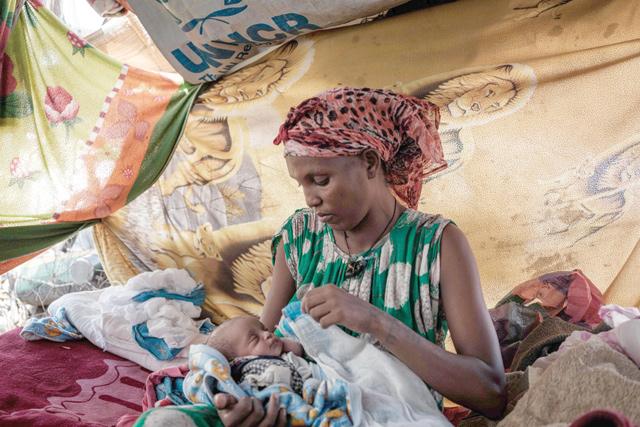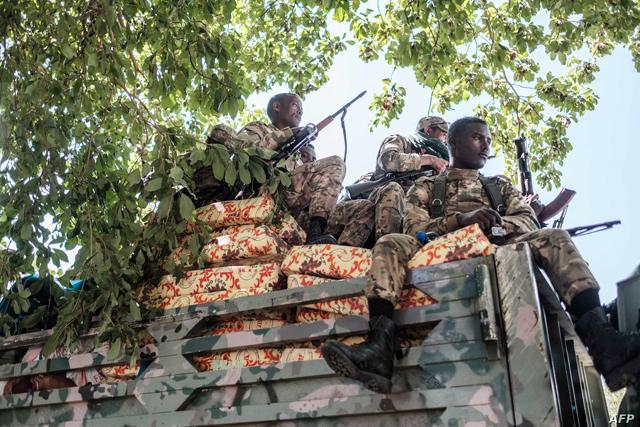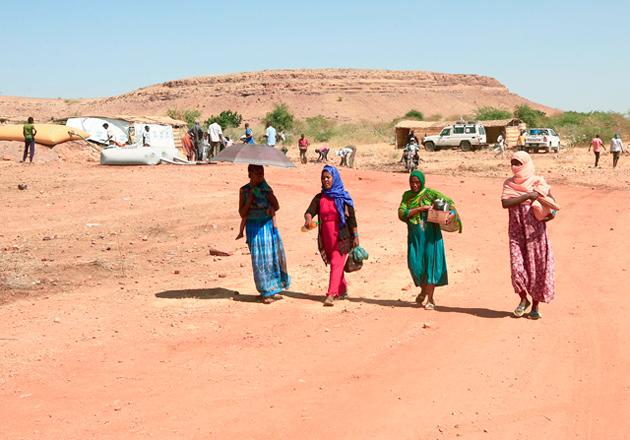You are here
Tigray fighting hampers aid delivery despite deal — UN
By AFP - Dec 05,2020 - Last updated at Dec 05,2020

Ethiopian refugee Aster Gebremechael, 34, who fled the Ethiopia's Tigray conflict, holds her five-days-old newborn daughter in a makeshift tent at the Border Reception Centre in Hamdayit, eastern Sudan, on Friday (AFP photo)
ADDIS ABABA — The United Nations said Friday that fighting continued "in many parts" of Ethiopia's Tigray, complicating efforts to deliver humanitarian aid despite a deal granting the UN access to territory under federal control.
Prime Minister Abiy Ahmed announced military operations in the northern region a month ago, saying they targeted the leaders of its ruling party, the Tigray People's Liberation Front (TPLF).
Last week, he declared victory, saying fighting was "completed" after federal forces entered the regional capital Mekele. But the TPLF has vowed to fight on.
"We have reports of fighting still going on in many parts of Tigray. This is concerning and it's a complex situation for us," Saviano Abreu, spokesman for the UN's humanitarian coordination office, told AFP.
The conflict has claimed thousands of lives, according to the International Crisis Group (ICG) think tank, and tens of thousands of refugees have streamed across the border into Sudan.
The UN has been warning of a possible humanitarian catastrophe within Tigray, though a communications blackout has made it difficult to assess conditions on the ground.
On Wednesday, the UN announced it had reached an agreement to administer aid in areas of Tigray that were government-controlled.
But as of Friday, security assessments were still being conducted and three UN officials told AFP that aid was not expected to arrive before next week.
'No access'
"Basically, at the moment there is no access," one official said, arguing that the UN and the government "should have held off" on announcing the deal until preparations were further along.
“When you go public in the fashion they did, it creates expectations for people who think, ‘Access has been given, why is help not reaching us?’” the official said, speaking on condition of anonymity because of the sensitivity of the subject.
Speaking to reporters Friday in Addis Ababa, Janez Lenarcic, the EU commissioner for crisis management, said it was “not acceptable” that aid be restricted to areas under government control.
“There may be malnourished children on the other side also,” he said.
The UN is continuing to negotiate “with all parties to the conflict” to ensure unfettered access, Abreu said.
He stressed that some aid was still being administered.
“Hundreds of humanitarians are still on the ground doing all they can to provide assistance to people affected by the conflict and those who were already in need before the fighting,” he said.
Refugee safety
Of a particular concern is the fate of roughly 96,000 Eritrean refugees who before the conflict were living in camps in northern Tigray in areas reported to have seen heavy fighting.
The UN earlier this week issued a public appeal for the government to allow aid into the camps, which are believed to have run out of food.
A government official told AFP there was likely a “buffer” of food supplies that would last through the week.
The UN refugee agency is eager to get food, medicine and other supplies to refugees and host communities, Ethiopia representative Ann Encontre told AFP Friday.
It also wants to assess “very grim” reports on the security of the camps, which it has been unable to verify because of the communications blackout, Encontre said.
“We’ve heard of deaths of refugees, we’ve heard of some being forced into conscription. We’ve heard of abductions,” she said.
The International Committee of the Red Cross reported Sunday that “some 1,000 Eritrean refugees have reportedly arrived in Mekele from refugee camps around Shire” in northern Tigray.
This week several Eritrean refugees previously living in Tigray also turned up in Sudan, Encontre said.
Lenarcic, the EU commissioner, visited camps in Sudan this week and said refugees told him it was too soon to go back to Ethiopia.
“They all said that they are too afraid to even think about it. They all said that they are happy they’re alive, even though they were left without any of their belongings,” he said.
He noted that refugees he spoke to blamed the government for acts of violence.
“They blamed Prime Minister Abiy,” he said.
The TPLF dominated Ethiopian politics for nearly three decades before anti-government protests swept Abiy to power in 2018.
The party then complained of being sidelined, and tensions escalated dramatically after Tigray went ahead with regional elections in September — defying a nationwide ban on polls because of the coronavirus pandemic — and sought to brand Abiy an illegitimate leader.
Tigrayan head Debretsion Gebremichael has vowed to continue fighting as long as federal “invaders” are on Tigrayan soil.
On Thursday he said fighting occurred “around Mekele”, and several diplomats also told AFP that clashes persisted in multiple locations in Tigray.
Related Articles
ADDIS ABABA — Ethiopian Prime Minister Abiy Ahmed declared victory in his military operation in the northern region of Tigray, but there are
ADDIS ABABA — Both sides in Ethiopia's raging internal conflict claimed military successes on Wednesday, creating a muddied picture of
ADDIS ABABA — The first international aid convoy arrived Saturday in the capital of Ethiopia's Tigray region since fighting broke out more t



















